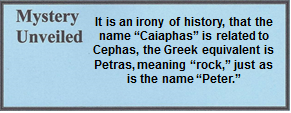15.03.02 Jn. 18:13-14 Jerusalem
FIRST JEWISH TRIAL: JESUS LED TO ANNAS
13 First they led Him to Annas, for he was the father-in-law of Caiaphas, who was high priest that year. 14 Caiaphas was the one who had advised the Jews that it was advantageous that one man should die for the people.
Annas was the high priest from A.D. 6 to 15 and a devoted Sadducee. There is, at times, some difficulty identifying the high priest.[1] Acts 4:6 identifies him as holding the position, while Luke 3:2 appears to identify both Annas and Caiaphas as holding the position jointly. The difficulty is resolved by understanding that a former high priest was still called by his title as an honor, even though he no longer functioned in the office of priesthood. In a similar manner today, a retired president of a nation continues to be addressed as “Mr. President.”
History reveals that Caiaphas was in the official position. However, his retired father-in-law, Annas, was still respected in an unofficial capacity, as he had been deposed by procurator Valerius Gratus, who held the rulership position prior to Pontius Pilate.[2]
The high priest, who was to represent the people before Almighty God, was the single most important destructive influence to kill Jesus. Both men were delighted to see Jesus tied, bound, and in court. Caiaphas remembered all too well the trouble Jesus caused him previously – the two cleansings of the temple caused financial losses, not to mention the humiliation he and his fellow Sadducees received. For him this day was long overdue. He finally had the opportunity to apply revengeful justice, as he desired. His corruption in the temple was so well known, that centuries later when the Talmud was written, his name was associated with the sacred sites being converted into a “market-house” and “den of robbers.”
“Caiaphas was the one who had advised the Jews.” Caiaphas was the official supreme leader of Judaism. As the high priest of the temple, he gave direction in the affairs of the faith. The Greek equivalent is “Petras,” which means “rock.” It is the same name Jesus gave to Peter (Jn. 1:42), indicating that His testimony would build a church. Ironically it is also the same root name that in Hebrew means Caiaphas, who would try to kill Him.[3] Evidently, God the Father agreed. IN all probability, Satan never had a more trusted friend in the temple than he had in Caiaphas.

Finally, it is interesting that Caiaphas “advised” his fellow supporters on the question. In fact, the attendees of this court were selected men whom he controlled and manipulated. They all owed him favors, as he was the wealthiest and most powerful Jew in the country. Everyone present was successful, to some measure, in religious or business enterprises, due all or in part to Caiaphas. It was time now for Caiaphas to collect on his many favors and gifts. The judges of the Supreme Court were in fact purchased and paid for by its president.
A profound statement uttered by Caiaphas was, “it was advantageous that one man should die for the people.” That was precisely why Jesus came, but obviously not in the manner Caiaphas understood. He desired to have Jesus put to death to protect his own position in the temple and end the onslaught of insults. More importantly, he was afraid Jesus might cause the Romans to take tighter military control of Jerusalem. He was aware that any collision with Roman authorities would endanger his powerful position, which had afforded him and his extended family extreme wealth and luxury. Beginning at this point, the trial of Jesus was illegal in every manner possible.
[1]. See 03.06.21, 03.06.22, and 03.06.26 as well as the terms of service in Appendix 1.
[2]. See terms of service in Appendix 1.
[3]. Kennedy, “Christ’s Trials and Ours.” 6.